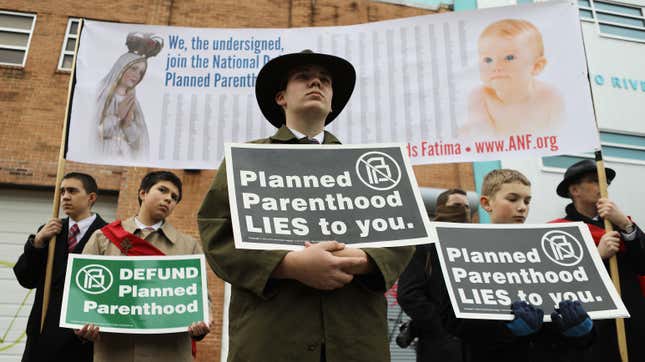

Obria, if you’ll recall, is the network of Christian anti-abortion clinics that is currently trying to position itself as a “holistic” alternative to Planned Parenthood while publicly glossing over the fact that it does not offer abortion or contraception services. The nonprofit, after expanding some of its medical services and undergoing a slick rebrand that largely buries its anti-abortion mission, is also making a real run at public family planning funding to grow its clinics and mission.
This plan is apparently working. In May, Obria clinics in California were granted Title X funding for the first time, a realization of the nonprofit’s longstanding goals. And two reports out this week suggest that the $5.1 million earmarked by Trump’s department of Health and Human Services aren’t the only major sources of public funding Obria has managed to secure.
On Monday, the Campaign for Accountability released a detailed report on Obria’s financial history pointing out how successful its deceptive strategy has been: “Obria has been at the vanguard of [crisis pregnancy centers] trying to camouflage their religious operations in order to receive federal funding,” the group wrote. The report suggests that Obria and its earlier iterations, including a Christian homeless shelter affiliated with the group and overseen by Obria’s CEO, have misappropriated funds and misled government officials about how grants are being used.
From the report:
Obria’s transition from an organization adamantly opposed to government funding and hiring full time employees, to an organization structured and operated in pursuit of government funding to support its well-paid CEO reflects the larger metamorphosis of the anti-choice movement. Beyond limiting access to abortion, anti-choice advocates are also trying to divert government funds to their own bank accounts in order to decrease funding to women’s health providers that deliver straightforward healthcare services to low-income women and children.
Earlier this year, Campaign for Accountability also filed a lawsuit against the Department of Health and Human Services, seeking more information about Obria’s communications with HHS officials prior to its Title X grant.
Most of Obria’s funding has been in the form of private donations from religious organizations and prominent Christian activists (the U.S. Conference of Catholic Bishops has been a major supporter), but the Center for Accountability’s report suggests that the Title X funding is only the largest and most prominent of Obria’s public funding sources. Drawing on tax filings and other documents, the report found that prior to Obria’s Title X grant, the organization had received nearly $3 million in government money on the local, state, and federal level.
It also found that, starting in 2009, the Orange County Board of Supervisors awarded hundreds of thousands of dollars from a tobacco settlement fund to Obria—money that was intended to fund abstinence-only sex education. The Center for Accountability alleges this money was funneled back into Obria’s clinics, rather than into Teen Integrity, an affiliated nonprofit set up specifically for the education program. Obria CEO Kathleen Eaton Bravo’s “bait and switch with the Orange County Board of Supervisors appears to have been just one of many maneuvers she employed to cover the cost of running” her crisis pregnancy centers, the report alleges.
Together, Obria’s affiliates have reported $32 million in revenue on their tax filings since 2001, according to Center for Accountability. Bravo, the group’s CEO and most prominent spokesperson, has received more than $1.8 million in salary since 2003. Around 2013, Bravo’s husband’s remodeling company was paid $76,809 by Obria for a “build-out” of one of its facilities.
Government entities aren’t the only ones offering grants and incentives to Obria based on its nebulous pitches about reproductive care. On Monday, The Guardian reported that The Obria Group, the clinics’ national network, had received $120,000 in Google advertising grants in 2015, as well as nearly $32,000 in 2011. The tech company has been criticized in the past for failing to adequately regulate crisis pregnancy centers that advertise on its platform. Last year, Gizmodo reported that women searching for abortion providers on Google Maps were being recommended fake clinics offering—but not actually performing— abortions instead.
Since Obria received Title X funding last month, its policy of not offering contraceptives has been the subject of some confusion. Obria’s original Title X application suggested it would partner with organizations that provided condoms and hormonal birth control, and two subcontracted clinics apparently do offer contraception. This month, unnamed HHS officials told Politico the department wouldn’t force the remaining three Obria clinics in California to provide care that contradicted its religious convictions. The House Oversight Committee is reportedly looking into the use of federal reproductive health grants to fund a clinic that does not offer core services. Last month, Eaton told Jezebel in an email “we do not do abortions, nor do we distribute contraceptives. Pregnant women who come to us are made aware of all this.”
Obria representatives have not responded to Jezebel’s request for comment on the Center for Accountability’s report, and will update the piece if and when they do. Meanwhile, in Des Moines, Iowa, where an Obria-affiliated clinic is advertising itself as a natural alternative to other reproductive health centers and does not offer birth control, a clinic worker told the local paper: “Not all women want to put chemicals in their bodies. This gives women a choice that doesn’t involve putting medicine in their body.”